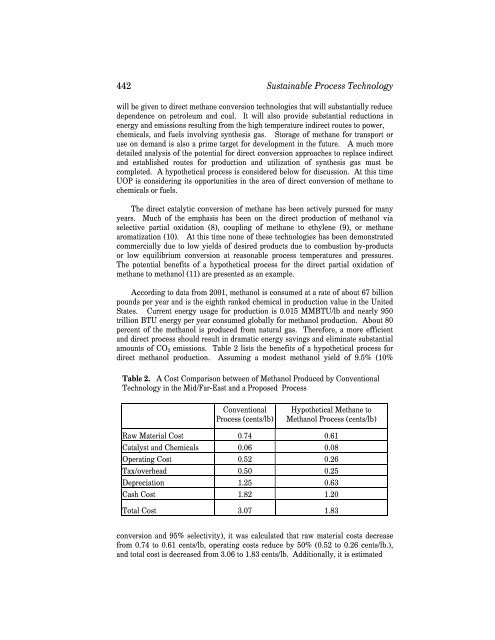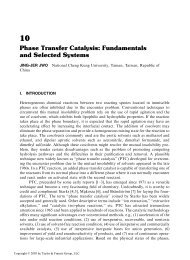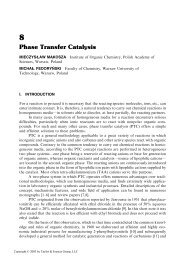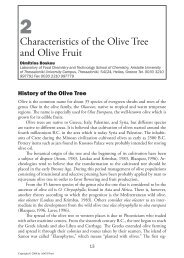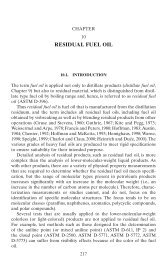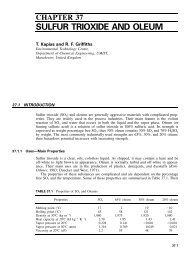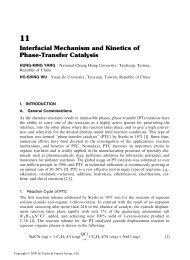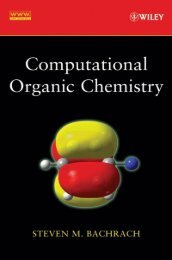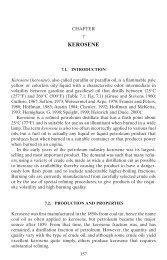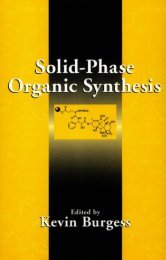- Page 2:
Catalysis ofOrganic Reactions
- Page 5 and 6:
14. Catalyst Manufacture: Laborator
- Page 7 and 8:
62. Catalysis of Organic Reactions,
- Page 9 and 10:
108. Metal Oxides: Chemistry and Ap
- Page 11:
CRC PressTaylor & Francis Group6000
- Page 14:
xiii14. The Transformation of Light
- Page 18 and 19:
xviien Catalisis y Petroquimica (UN
- Page 20:
xix56. Transition Metal Removal fro
- Page 24:
xxiiiChronology of Organic Reaction
- Page 27 and 28:
To Zsuzsanna and Tim
- Page 30 and 31:
Jones et al. 31. On the Use of Immo
- Page 32 and 33:
Jones et al. 5three-phase tests in
- Page 34 and 35:
Jones et al. 7In the HKR of rac-epi
- Page 36 and 37:
Jones et al. 9term performance char
- Page 38 and 39:
Jones et al. 115. A. S. Gruber, D.
- Page 40 and 41:
Moses et al. 132. Supported Re Cata
- Page 42 and 43:
Moses et al. 15perrhenate, followed
- Page 44 and 45:
Moses et al. 17SnCOSnMe 4≡SiOReO
- Page 46 and 47:
Moses et al. 19(AlOSi) of the cube.
- Page 48 and 49:
Moses et al. 212.510 3 k obs / s -1
- Page 50 and 51:
Wang et al. 233. Catalytic Hydrogen
- Page 52 and 53:
Wang et al. 25The rate expressions
- Page 54 and 55:
Wang et al. 27Schiff’s base forma
- Page 56:
Wang et al. 29AcknowledgementsWe gr
- Page 59 and 60:
32Halophosphite LigandsIn 1970, Pru
- Page 61 and 62:
34Halophosphite LigandsThe ligands,
- Page 63 and 64:
36Halophosphite LigandsTable 2 Temp
- Page 65 and 66:
38Halophosphite Ligands3. P. W. N.
- Page 67 and 68:
40Monolithic Bioreactorstrength for
- Page 69 and 70:
42Monolithic BioreactorMenten equat
- Page 72 and 73:
Gőbölös et al. 456. Highly Selec
- Page 74 and 75:
Gőbölös et al. 47was practically
- Page 76 and 77:
Gőbölös et al. 49noteworthy that
- Page 78 and 79:
Gőbölös et al. 51Figure 2 NMR sp
- Page 80:
Gőbölös et al. 53internal TMS in
- Page 83 and 84:
56Hydrotalcite-like Catalysts[A n-
- Page 85 and 86:
58Hydrotalcite-like Catalystssample
- Page 88 and 89:
Mantilla, Tzompantzi, Torres and G
- Page 90 and 91:
Mantilla, Tzompantzi, Torres and G
- Page 92:
Mantilla, Tzompantzi, Torres and G
- Page 95 and 96:
68Synthesis of MIBKwe examined the
- Page 97 and 98:
70Synthesis of MIBK1412Conversion (
- Page 99 and 100:
72Synthesis of MIBK4,4’-dimethyl
- Page 101 and 102:
74Synthesis of MIBKobtained for MIB
- Page 104 and 105:
Ardizzi et al. 7710. The Control of
- Page 106 and 107:
Ardizzi et al. 79type acidity at th
- Page 108:
Ardizzi et al. 81procedure describe
- Page 111 and 112:
84Phenol Benzoylationconsecutive Fr
- Page 113 and 114:
86Phenol BenzoylationThis does not
- Page 116:
II. Symposium on Catalytic Oxidatio
- Page 119 and 120:
92Oxidation with Microchannel Immob
- Page 121 and 122:
94Oxidation with Microchannel Immob
- Page 123 and 124:
96Oxidation with Microchannel Immob
- Page 125 and 126:
98Oxidation with Microchannel Immob
- Page 127 and 128:
100 Propylene Partial OxidationThe
- Page 129 and 130:
102 Propylene Partial OxidationSiO
- Page 131 and 132:
104 Propylene Partial Oxidation0.01
- Page 133 and 134:
106 Propylene Partial Oxidation0.02
- Page 135 and 136:
108 Propylene Partial OxidationRefe
- Page 137 and 138:
110Oxidation of n-Pentanemethacryli
- Page 139 and 140:
112Oxidation of n-PentaneFReqox1ox2
- Page 141 and 142:
114Oxidation of n-Pentanethe presen
- Page 143 and 144:
116Oxidation of n-PentaneIn the mec
- Page 145 and 146:
118Oxidation of n-PentaneReferences
- Page 147 and 148:
120TEMPO Oxidation of Alcoholsthe u
- Page 149 and 150:
122TEMPO Oxidation of AlcoholsThe r
- Page 151 and 152:
124TEMPO Oxidation of Alcoholsany d
- Page 153 and 154:
126TEMPO Oxidation of Alcoholsconce
- Page 155 and 156:
128TEMPO Oxidation of AlcoholsMNT :
- Page 157 and 158:
130TEMPO Oxidation of Alcoholsuptak
- Page 159 and 160:
132Aminoalcohols to Aminocarboxylic
- Page 161 and 162:
134Aminoalcohols to Aminocarboxylic
- Page 163 and 164:
136Aminoalcohols to Aminocarboxylic
- Page 165 and 166:
138Aminoalcohols to Aminocarboxylic
- Page 167 and 168:
140Aminoalcohols to Aminocarboxylic
- Page 169 and 170:
142Bromine-Free TEMPO-Based Catalys
- Page 171 and 172:
144Bromine-Free TEMPO-Based Catalys
- Page 173 and 174:
146Bromine-Free TEMPO-Based Catalys
- Page 175 and 176:
148CO OxidationP25 TiO 2 , respecti
- Page 177 and 178:
150CO Oxidation0.02(a)21802110(b)21
- Page 179 and 180:
152CO Oxidationcarboxylate species
- Page 182 and 183:
Yamauchi 15519. 2006 Murray Raney A
- Page 184 and 185:
Yamauchi 157transformation is schem
- Page 186 and 187:
Yamauchi 159The X-ray diffraction p
- Page 188 and 189:
Yamauchi 161was -0.0009, -0.0032 an
- Page 190 and 191:
Yamauchi 163shown in Fig. 12. It wa
- Page 192:
Yamauchi 165These fine particles we
- Page 195 and 196:
168Nitrobenzene Hydrogenationfurthe
- Page 197 and 198:
170Nitrobenzene Hydrogenationhydrog
- Page 199 and 200:
172Nitrobenzene HydrogenationThe co
- Page 201 and 202:
174Nitrobenzene HydrogenationHence
- Page 203 and 204:
176Nitrobenzene Hydrogenation10. G.
- Page 205 and 206:
178 Hydrogenation of Dehydrolinaloo
- Page 207 and 208:
180 Hydrogenation of Dehydrolinaloo
- Page 209 and 210:
182 Hydrogenation of Dehydrolinaloo
- Page 211 and 212:
184 Hydrogenation of Dehydrolinaloo
- Page 213 and 214:
186 Hydrogenation of Dehydrolinaloo
- Page 215 and 216:
188Modeling Mass Transfer Hydrogena
- Page 217 and 218:
190Modeling Mass Transfer Hydrogena
- Page 219 and 220:
192Modeling Mass Transfer Hydrogena
- Page 221 and 222:
194Modeling Mass Transfer Hydrogena
- Page 223 and 224:
196Modeling Mass Transfer Hydrogena
- Page 225 and 226:
198 Fructose HydrogenationHOHCCH 2O
- Page 227 and 228:
200 Fructose HydrogenationTable 1.
- Page 229 and 230:
202 Fructose Hydrogenationmmol form
- Page 231 and 232:
204 Fructose Hydrogenationthe subst
- Page 233 and 234:
206 Fructose Hydrogenationcleave th
- Page 235 and 236:
208 Fructose Hydrogenationfulfills
- Page 237 and 238:
210 Fructose Hydrogenationis not th
- Page 240 and 241:
Disselkamp et al. 21324. Cavitating
- Page 242 and 243:
Disselkamp et al. 215column. In a p
- Page 244 and 245:
Disselkamp et al. 217selectivity es
- Page 246 and 247:
Disselkamp et al. 219hydrogenated (
- Page 248 and 249:
Disselkamp et al. 221A somewhat mor
- Page 250 and 251:
Disselkamp et al. 223Scheme 4.cis-2
- Page 252 and 253:
Disselkamp et al. 225conventional c
- Page 254 and 255:
Ostgard et al. 22725. The Treatment
- Page 256 and 257:
Ostgard et al. 229Table 1. The reac
- Page 258 and 259:
Ostgard et al. 231metal atoms. Thes
- Page 260 and 261:
Ostgard et al. 233In conclusion, th
- Page 262 and 263:
Kuusisto, Mikkola and Salmi 23526.
- Page 264 and 265:
Kuusisto, Mikkola and Salmi 237100A
- Page 266:
Kuusisto, Mikkola and Salmi 2399. B
- Page 269 and 270:
242 1-Phenyl-1-Propyneof cis-β-met
- Page 271 and 272:
244 1-Phenyl-1-Propynealkene. When
- Page 274 and 275:
Musolino, Apa, Donato and Pietropao
- Page 276 and 277:
Musolino, Apa, Donato and Pietropao
- Page 278 and 279:
Musolino, Apa, Donato and Pietropao
- Page 280 and 281:
Gőbölös and Margitfalvi 25329. R
- Page 282 and 283:
Gőbölös and Margitfalvi 255maxim
- Page 284:
Gőbölös and Margitfalvi 257Y=421
- Page 288 and 289:
Rothenberg et al. 26130. How to Fin
- Page 290 and 291:
Rothenberg et al. 263By dividing th
- Page 292 and 293:
Rothenberg et al. 265pre-define the
- Page 294 and 295:
Rothenberg et al. 267Table 1. Parti
- Page 296 and 297:
Rothenberg et al. 269Experimental S
- Page 298 and 299:
Angueira and White 27131. Novel Chl
- Page 300 and 301:
Angueira and White 273optimizedgeom
- Page 302 and 303:
Angueira and White 275F igure 4 - c
- Page 304 and 305:
Angueira and White 277Table 1. 27 A
- Page 306 and 307:
Angueira and White 279obtained from
- Page 308 and 309:
Robitaille, Clément, Chapuzet and
- Page 310 and 311:
Robitaille, Clément, Chapuzet and
- Page 312 and 313:
Robitaille, Clément, Chapuzet and
- Page 314 and 315:
Robitaille, Clément, Chapuzet and
- Page 316 and 317:
Cao, White, Wang and Frye 28933. Se
- Page 318:
Cao, White, Wang and Frye 291Experi
- Page 321 and 322:
294Chiral Ferrocene Ligandsnew Twin
- Page 323 and 324:
296Chiral Ferrocene LigandsTable 1.
- Page 325 and 326:
298Chiral Ferrocene Ligandsprevents
- Page 327 and 328:
300Chiral Ferrocene LigandsConclusi
- Page 329 and 330:
302Chiral Ferrocene Ligandsextracte
- Page 331 and 332:
304 Catalyst Library DesignIn gas p
- Page 333 and 334:
306 Catalyst Library Designd−(b 0
- Page 335 and 336:
308 Catalyst Library DesignBasic Pr
- Page 337 and 338:
310 Catalyst Library DesignD in com
- Page 339 and 340:
312 Catalyst Library DesignCatalyst
- Page 341 and 342:
314 Catalyst Library Design27. S. H
- Page 343 and 344:
316 Dendrimer TemplatesWe are devel
- Page 345 and 346:
318 Dendrimer TemplatesThe differen
- Page 347 and 348:
320 Dendrimer TemplatesWe encounter
- Page 349 and 350:
322 Dendrimer TemplatesThe 100 cm -
- Page 352:
V. Symposium on Acid and Base Catal
- Page 355 and 356:
328Rearrangement of 3,4-Epoxy-1-But
- Page 357 and 358:
330Rearrangement of 3,4-Epoxy-1-But
- Page 359 and 360:
332Rearrangement of 3,4-Epoxy-1-But
- Page 361 and 362:
334Rearrangement of 3,4-Epoxy-1-But
- Page 363 and 364:
336Rearrangement of 3,4-Epoxy-1-But
- Page 365 and 366:
3382,5-Dimethyl-2,4-Hexadieneharves
- Page 367 and 368:
3402,5-Dimethyl-2,4-Hexadienestabil
- Page 369 and 370:
3422,5-Dimethyl-2,4-Hexadiene10086Y
- Page 371 and 372:
3442,5-Dimethyl-2,4-Hexadienereacti
- Page 373 and 374:
3462,5-Dimethyl-2,4-Hexadiene8. www
- Page 375 and 376:
348Heteropoly AcidsSOOO O+ +OS1 2 3
- Page 377 and 378:
350Heteropoly AcidsTable 3. Acylati
- Page 379 and 380:
352Heteropoly AcidsSiO 2 is the bes
- Page 382 and 383:
Diez, Di Cosimo and Apesteguia 3554
- Page 384 and 385:
Diez, Di Cosimo and Apesteguia 357T
- Page 386 and 387:
Diez, Di Cosimo and Apesteguia 359A
- Page 388 and 389:
Diez, Di Cosimo and Apesteguia 361I
- Page 390 and 391:
Diez, Di Cosimo and Apesteguia 3630
- Page 392 and 393:
O’Keefe, Jiang, Ng and Rempel 365
- Page 394 and 395:
O’Keefe, Jiang, Ng and Rempel 367
- Page 396 and 397:
O’Keefe, Jiang, Ng and Rempel 369
- Page 398 and 399:
O’Keefe, Jiang, Ng and Rempel 371
- Page 400 and 401:
O’Keefe, Jiang, Ng and Rempel 373
- Page 402:
VI. Symposium on “Green” Cataly
- Page 405 and 406:
378 Polyurethane from Natural OilMe
- Page 407 and 408:
380 Polyurethane from Natural Oilco
- Page 409 and 410:
382 Polyurethane from Natural Oilfr
- Page 411 and 412:
384 Polyurethane from Natural OilTh
- Page 413 and 414:
386 Carbonylation of Chloropinacolo
- Page 415 and 416:
388 Carbonylation of Chloropinacolo
- Page 417 and 418: 390 Carbonylation of Chloropinacolo
- Page 419 and 420: 392 Carbonylation of Chloropinacolo
- Page 421 and 422: 394 Carbonylation of Chloropinacolo
- Page 423 and 424: 396 Recycling Homogeneous Catalysts
- Page 425 and 426: 398 Recycling Homogeneous Catalysts
- Page 427 and 428: 400 Recycling Homogeneous Catalysts
- Page 429 and 430: 402 Recycling Homogeneous Catalysts
- Page 431 and 432: 404 Recycling Homogeneous Catalysts
- Page 433 and 434: 406“Green” Catalysts for Biodie
- Page 435 and 436: 408“Green” Catalysts for Biodie
- Page 437 and 438: 410“Green” Catalysts for Biodie
- Page 439 and 440: 412“Green” Catalysts for Biodie
- Page 441 and 442: 414“Green” Catalysts for Biodie
- Page 443 and 444: 416 Production of BiodieselTable 1.
- Page 445 and 446: 418 Production of Biodieselto a mas
- Page 447 and 448: 420 Production of BiodieselEthyl st
- Page 449 and 450: 422 Production of Biodiesel10080Sel
- Page 451 and 452: 424 Production of Biodieselproduct
- Page 453 and 454: Marincean et al. 42747. Glycerol Hy
- Page 455 and 456: Marincean et al. 429Experimental Se
- Page 457 and 458: Marincean et al. 431neutralize all
- Page 459 and 460: Marincean et al. 433suggesting that
- Page 461 and 462: Marincean et al. 435increasing from
- Page 464 and 465: Kocal 43748. Developing Sustainable
- Page 466 and 467: Kocal 439description of the four st
- Page 470 and 471: Kocal 443that capital investment co
- Page 472: Kocal 4455. J.J. Siirola, An Indust
- Page 475 and 476: 448Propylene Oxidation to POSupercr
- Page 477 and 478: 450Propylene Oxidation to POTable 1
- Page 479 and 480: 452Propylene Oxidation to PO
- Page 482 and 483: Riermeier et al. 45550. catASium ®
- Page 484 and 485: Riermeier et al. 457It is interesti
- Page 486 and 487: Riermeier et al. 459Reaction of the
- Page 488: Riermeier et al. 461References1. I.
- Page 491 and 492: 464 Chiral 2-Amino-1-Phenylethanolp
- Page 493 and 494: 466 Chiral 2-Amino-1-PhenylethanolI
- Page 495 and 496: 468 Chiral 2-Amino-1-Phenylethanola
- Page 497 and 498: 470 t-Butanol DehydrationResults an
- Page 499 and 500: 472 t-Butanol Dehydrationcomprises
- Page 502 and 503: Pohlmann et al 47553. Leaching Resi
- Page 504 and 505: Pohlmann et al 477this study. In th
- Page 506: Pohlmann et al 479Experimental Sect
- Page 509 and 510: 482 Reductive AlkylationSince the p
- Page 511 and 512: 484 Reductive AlkylationTable 2. Re
- Page 514 and 515: Wolf, Seebald and Tacke 48755. Acce
- Page 516 and 517: Wolf, Seebald and Tacke 489100Norma
- Page 518 and 519:
Wolf, Seebald and Tacke 4911,88Figu
- Page 520 and 521:
Woods et al. 49356. Transition Meta
- Page 522 and 523:
Woods et al. 495Effect of oxidation
- Page 524 and 525:
Woods et al. 497
- Page 526:
Woods et al. 499removed the samples
- Page 529 and 530:
502 Electroreductive Catalytic Ullm
- Page 531 and 532:
504 Electroreductive Catalytic Ullm
- Page 534 and 535:
Catalysis of Organic Reactions 507A
- Page 536 and 537:
Catalysis of Organic Reactions 509K
- Page 538:
Catalysis of Organic Reactions 511T
- Page 541 and 542:
514 Keyword Indexcarboncarbon dioxi
- Page 543 and 544:
516 Keyword Indexethanolamine 16 13
- Page 545 and 546:
518 Keyword IndexNi, activated 25 2
- Page 547:
520 Keyword Indexsuccinimido ketone


